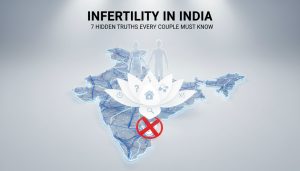What is Secondary Infertility?
Going through the process of artificial reproduction is as much a journey through the medical process as it is an emotional process of trying to overcome several blocks.
Firstly, no one including the doctors can be precise about the reasons for infertility. Let’s talk about one ‘secondary infertility’.
Secondary infertility is the inability to become pregnant or to carry a baby to term after previously giving birth to at least one child.
It is confusing, difficult to comprehend and assess. One pregnancy was good, so why not now? A lot of couples have gone through the confusion.
There are many causes of secondary infertility, a few of the possible reasons being the following:
1. Impaired production of sperms
2. Damage to the Fallopian tubes, disorders of ovulation
3. Endometriosis
4. Complications from previous pregnancy or surgery
5. Fibroid
6. Weight, age, etc.
According to the Center for Disease Control in the US, 11% of couples who have had a child, experience secondary infertility. Indian numbers are yet to be reported and assessed.
It’s an emotionally complex situation. As a couple you have had a child, you want to then expand the family and have certain aspirations. And suddenly the pregnancy does not happen.
So, it’s a bit difficult to understand as well as accept. The other conundrum is to speak out and get suggestions from friends or doctors. Previously having a child in a way makes it difficult to communicate such a condition.
The medical causes are also a bit more difficult to diagnose than primary infertility.
Broadly one-third of the cases are related to male infertility, one third to female infertility and one third to both or some other unexplained causes. Let’s answer a few questions:
Why can’t I conceive this time around?
You’re older, maybe around 35 or more which makes it a bit difficult
There was a fertility problem which reemerged and is preventing conception
The first pregnancy may have been difficult and that has decreased chances of conception like a blocked tube or some adhesion in the uterus
Sometimes the reason is unknown and cannot be explained
When should I seek help?
About a year of trying with no results, you should seek help from your doctor.
Also, meet your doctor in case of frequent miscarriages. Seeking help will only support your efforts, not seeking won’t solve anything.
What tests do I need to undergo?
The tests are similar to primary infertility. For men, sperm counts and for women, hormonal as well as other tests including ultrasound, HSG, etc.
What is the treatment for secondary infertility?
Some of the treatments are as follows:
1. Fertility drugs
2. IVF
3. IUI
4. Surgery in case of adhesions or blockage
At Subhag we ensure that IUI is performed by trained personnel and they will always ensure that you are informed of the three Ps: precaution, preparation, and plan of treatment. The kit used is also tested well and designed for safe use at home.
Keys to successful IUI?
Success in IUI depends on the following (aside from the age and hormonal factors):
1. Monitoring of cycles
2. Medications
3. Counseling and proper preparation, both emotional and physical
4. Quality of sperms and egg
5. Proper follow up on instructions given by the doctor
The most important thing to note for all couples is to be patient with the treatment. IUI is a very safe and effective process, and being patient and positive will only help you achieve the desired results.
Would you recommend IUI at home?
At Subhag, we believe in evidence-based processes and we assure you safe IUI and a safe journey thereafter.






